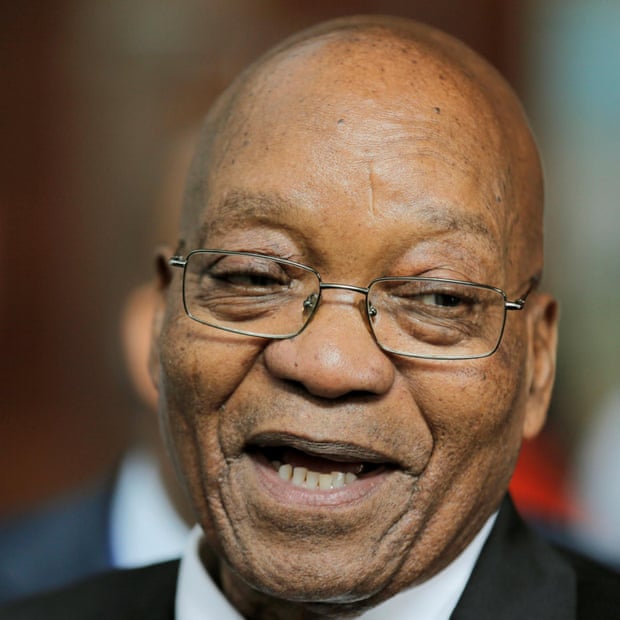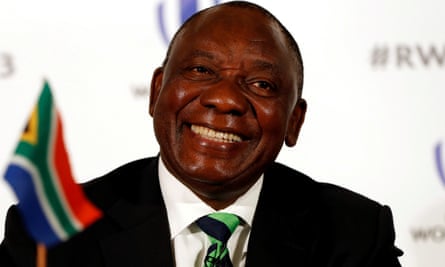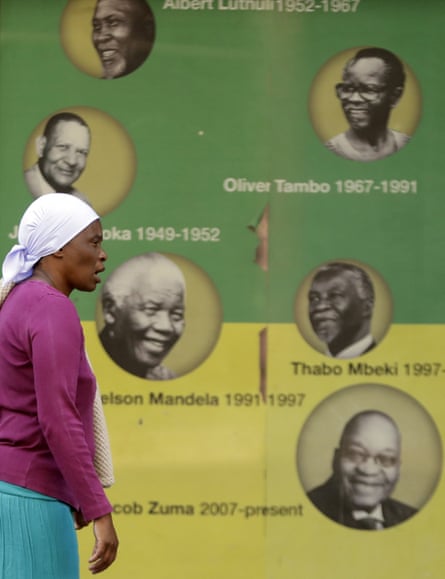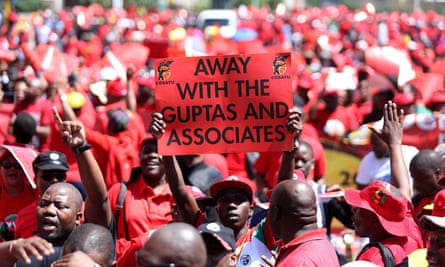Jacob Zuma’s resignation as president of South Africa ends a nine-year rule seen by many as the most troubled period for the “rainbow nation” since the end of the apartheid regime 24 years ago.
Zuma’s decision came after days of intense pressure from opponents within the African National Congress (ANC), the deeply divided ruling party.
Quick GuideJacob Zuma charge sheet
Show

- Zuma is facing 18 charges of money laundering, racketeering and fraud based on allegations relating to more than 700 payments between 1995 and the 2000s. Some of the charges are said to be linked to a multibillion-dollar arms deal in 1999. The charges were dropped shortly before Zuma became president in 2009, but were reinstated in 2016. He is appealing against that decision, and denies any wrongdoing.
- In 2014, a constitutionally mandated independent corruption watchdog accused Zuma of spending millions of pounds of taxpayers’ money to turn his house in his home village of Nkandla into a display of “opulence on a grand scale”. Zuma denied the charge but South Africa’s highest court eventually forced him to repay some of the money.
- The ex-president has repeatedly been accused of improper relations with the Guptas, a very wealthy family of businessmen. Zuma’s son works for the Guptas and the president is accused of allowing the family to benefit from government contracts and handpick senior officials. Zuma and the Guptas deny any wrongdoing.
- In 2016, Zuma was forced to order a review of the purchase with public funds of hundreds of thousands of pounds’ worth of cars for his four wives. The 11 cars included four Range Rover SUVs and two Land Rover Discovery SUVs.
The political veteran leaves office mired in claims of wrongdoing, ranging from improper relations with a family of wealthy businessmen to economic mismanagement. He has denied all the allegations against him.
Cyril Ramaphosa, the deputy president and standard-bearer of the reformist wing of the ANC, will take power as interim president pending election by parliamentary vote.
The news will please the business community, markets and international investors. Millions of South Africans from all communities, who were concerned about the long-term consequences of Zuma’s rule for a country struggling to overcome many of the most damaging legacies of its troubled history, will also be relieved. Some are already talking about a “Cyril spring”.
“He’s a good man. He [Ramaphosa] has the country’s interests in his heart, not his own or some family’s,” said Gwede Dube, a 39-year-old carpenter, as he queued in central Johannesburg for an overcrowded minibus to return to his home on the distant outskirts.
Ramaphosa, 65, a former union leader and multimillionaire businessman, won the ANC leadership in a hotly contested internal election in December and will lead the party into a general election next year.

Zuma had led the ANC since 2007. His tenure in that post and as president was controversial.
Many ANC loyalists accused him of having undermined the image and legitimacy of the 105-year-old party that led South Africans to freedom in 1994 and has ruled since.
Others on the left of the party said Zuma was a radical reformer who tried to help South Africa’s poorest but fell victim to the “forces of capitalism”.
“Our past legacy is oppression and theft. These capitalist forces decide who can be a president in our country. He never assessed this reality … so his approach was wrong,” said Billy Tsotetsi, an ANC official and TV commentator.

The ANC still dominates the country’s political landscape, but its popularity has been dented by a failure to transform the lives of South Africa’s poor. The party lost control of several cities in municipal elections in 2016 and, even with Ramaphosa in power, may be forced into a coalition.
It is unclear whether Zuma, who was born in a remote village and grew up in poverty in what is today South Africa’s south-eastern KwaZulu-Natal province, tried to negotiate any deal to protect himself from prosecution on corruption charges.
But his stubborn resistance to giving up power did not surprise analysts.
“He gave a lesson in how to protect yourself and build your own empire. He can still say he has never been convicted in court. He can still say ‘show me what I did wrong’,” said Susan Booysen, a politics professor at the University of the Witwatersrand, Johannesburg.
The son of a policeman and a domestic worker, Zuma received no formal schooling and joined the ANC aged 17. Imprisoned under the apartheid regime, he was taught to read and write by other inmates in prison on Robben Island, where Nelson Mandela was also incarcerated.
Zuma left South Africa for Mozambique after his release, where he helped run ANC military training camps. He rose rapidly up the party hierarchy, becoming head of internal intelligence and security.
As apartheid crumbled, Zuma returned to South Africa and played a key role in countering the powerful Inkatha Freedom party in the south-east of the country, where he had grown up.
As a Zulu, Zuma stood out among the Xhosa-dominated leading ranks of the party, and his rough charisma contrasted with the aristocratic style of Mandela, a trained lawyer from a royal house, and the educated sophistication of Thabo Mbeki, who Zuma ousted as ANC leader in 2008.
This was seen as an advantage when Zuma won the 2009 general election. Many hoped his boisterous charm, traditional values and singing voice would help the ANC reconnect with its popular base.

Though an early move to overhaul to the country’s Aids policy has been credited with saving many lives, scandals rapidly mounted.
Booysen said: “There is so much disrepute coming from this era it is difficult to contemplate.”
Graft charges dating back to the 1990s were reinstated, while in 2016, Zuma was ordered by South Africa’s highest court to repay some of the taxpayers’ money used for upgrades to his sprawling homestead.
The highest-profile controversies have involved Zuma’s relations with the Guptas, one of South Africa’s wealthiest business families. Zuma has been accused of allowing them to benefit from lucrative government contracts and influence top official appointments.
Critics allege that Zuma presided over a vast patronage system irrigated by public funds. He denies any wrongdoing. The Guptas and Zuma’s many close associates, some of whom have also been accused of corruption by local media, also deny any wrongdoing.
Some have spoken of “the wheels coming off the vehicle of our state”.
“We have seen a weakening of critical institutions such as the South African Revenue Service, the National Prosecuting Authority and law enforcement bodies due to political meddling for private interests,” said Njabulo Ndebele, the chairman of the Nelson Mandela Foundation, in a rare political intervention in 2016.
Zuma’s economic management has also been fiercely criticised. During his two terms, South Africa’s population increased from 50 million to 55 million, while economic growth slumped. One of his final acts was to announce free tertiary education for worse-off students, a measure his own officials have described as unaffordable. His decision to sack two respected and experienced finance ministers roiled markets and sent the rand plunging.
The election of Ramaphosa as ANC leader in December signalled that his significance was waning.
Zuma had entertained delegates at the conference in Johannesburg with a rendition of his trademark tune – the struggle anthem Bring Me My Machine [Gun] – but his network of powerful supporters was unable to deliver enough votes to win his former wife, Nkosazana Dlamini-Zuma, the top party job.
It was clear that power was slipping away. Less than two months later, Zuma, the consummate inside operator, is on the outside.